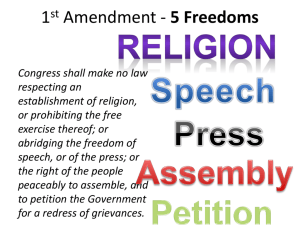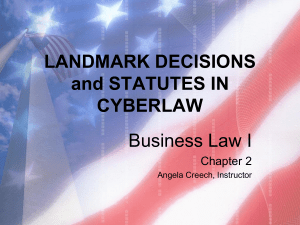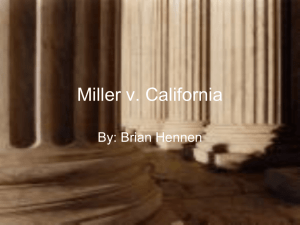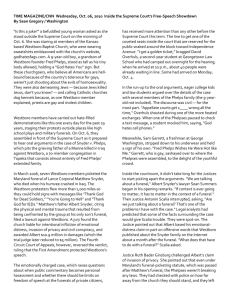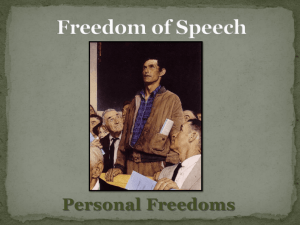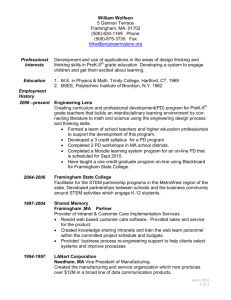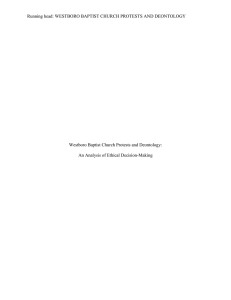Freedom of Speech Notes
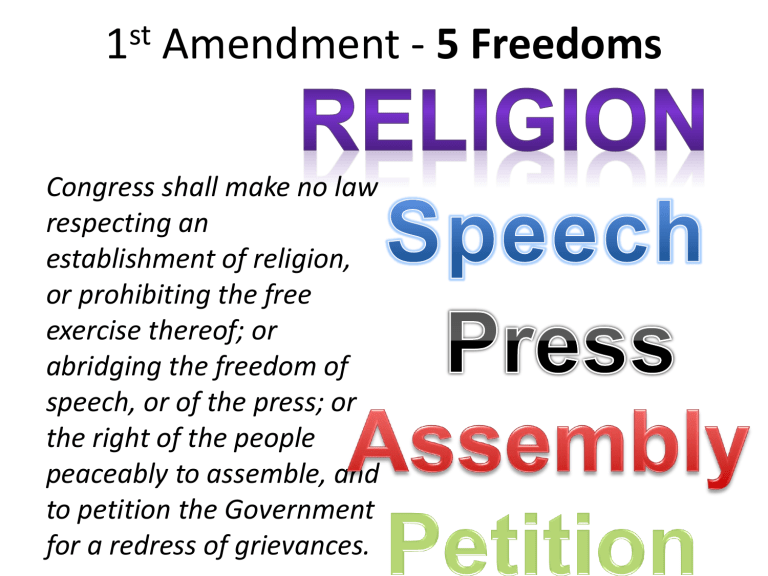
1
st
Amendment - 5 Freedoms
Congress shall make no law respecting an establishment of religion, or prohibiting the free exercise thereof; or abridging the freedom of speech, or of the press; or the right of the people peaceably to assemble, and to petition the Government for a redress of grievances.
Freedom of Speech
NO ONE HAS THE RIGHT TO DO ANYTHING
HE OR SHE PLEASES
• Yes – the Constitution guarantees many different rights to everyone in the U.S. BUT those rights must not INFRINGE on the rights of OTHERS
• Cannot cause HARM to another
The 1 st and 14 th Amendment serve 2 fundamentally important purposes:
• (1) To guarantee to each person a right of FREE
EXPRESSION
• (2) To guarantee to all persons a full, wideranging discussion of PUBLIC AFFAIRS
“freedom for the thought that we hate”
~Oliver Wendell Holmes, Justice,
1929
The Supreme Court has rejected an interpretation of speech without limits
– Over the years, the courts have decided that a few other public interests — for example – do need to be limited:
• national security, justice or personal safety
PRISONERS – LIMITED
Certain publications - not allowed to be sent to prison
• There are no simple rules for determining when speech should be limited, but there are some general tests that help.
Limit speech - sexual, criminal, or disruptive content
4 PART TURNER TEST
*Gov’t legitimate interest
*Other way to express yourself
Limits are challenged:
Before - outspoken radical and radio journalist
PRISON - Online Radio
Broadcast and writes articles on: Mass incarceration and other criminal justice issues
Mumia Abu-Jamal
Philly
Life Sentence - Killing
THEN… College
Commencement Address (prerecorded)
PA - Revictimization Relief Act
Prohibit “expressive conduct” by violent criminals – bringing mental anguish to victims or their families”
8 days ago - PA COURT –
UNCONSTITUTIONAL
NO ONE ENJOYS ABSOLUTE FREEDOM OF
SPEECH
What’s not protected by Constitution:
• (1) Shouting FIRE or BOMB in a crowded place
– words intended to cause mayhem
CONCERN – SINCE JAN – 50 Online threats
– False Fire Call $50,000 fine AND 20 Years Jail AND any restitution
• (2) False Advertising
• (3) Libel (print) and Slander (spoken)
– Speech that impugns a person’s reputation resulting in demonstrable harm, especially (but not exclusively) financial harm. Penalties - civil rather than criminal.
NO ONE ENJOYS ABSOLUTE FREEDOM OF
SPEECH - Not protected by Constitution:
• (4) Obscene Words and Printing and
Distributing obscene materials
– Words deemed to be pornographic or against community standards.
– Ex: This might include using swear words at a circus with lots of young children around, but would not include the same words used at a bar.
Supreme Court wrestles with this question:
What LANGUAGE and IMAGES in printed matter, films, and other materials are, in fact, obscene?
What type of RESTRICTIONS? There’s a test…
1973 Miller v. California
3-Part Test Is It Obscene?
MILLER TEST
( Three Prong Obscenity Test)
(1) AVERAGE PERSON (follows contemporary community standards) finds that the work tends to excite lust
(2)The work depicts and describes sexual content in offensive way
(3)The work lacks serious literary, artistic, political, or scientific value
Local attempts to regulate so-called adult bookstores and similar places
• 1 st and 14 th does not PREVENT a city from
REGULATING THE LOCATION of “adult entertainment establishments” theaters… "but rather the secondary effects of such theaters on the
surrounding community."
But what about if an obscene business pretends to be a legitimate business?
CONCERN:
If you have a group of people who
are lawbreakers, the level of their depravity will continue to increase…They will go further and further in their deviance
This will in turn increase their desire to break the law…
Where will it end?
With young and impressionable children nearby - very dangerous
The city will not allow them to operate as a sexoriented business so close to a school or church
NO ONE ENJOYS ABSOLUTE FREEDOM OF
SPEECH
Not protected by Constitution:
(5)
Clear and Present Danger
?? Will this act of speech create a DANGEROUS SITUATION??
Clear and Present Danger??
• A . Use of words to prompt others to
crime commit a
– A general comment like “people who provide
abortions should be stopped” would not be considered incitement
BUT a leader exhorting believers to carry out divine will by carrying out a death sentence for abortion providers might be considered incitement.
Clear and Present Danger??
• B.
Fighting Words
– Words that are specifically intended to provoke an immediate reaction that would constitute a breach of the peace.
– THREATS Speech that is intended to intimidate. This would include bullying and specific believable threats of physical harm. An offhand angry remark like “I could kill her” would not count, but saying, “I will kill you” to someone who believes that you have the will and means to do so would count. This is usually a criminal matter.
(Anthony Elonis Case)
Clear and Present Danger??
C. INTENTIONAL INFLICTION OF EMOTIONAL
DISTRESS
Extreme or outrageous speech intended specifically to cause an individual or group distress. Usually a civil rather than criminal matter.
What about protesting at military funerals?
• Snyder v. Phelps
"Westboro believes that America is morally flawed; many Americans might feel the same about Westboro. Westboro's funeral picketing is certainly hurtful and its contribution to public discourse may be negligible. But Westboro addressed matters of public import on public property, in a peaceful manner, in full compliance with the guidance of local officials. The speech was indeed planned to coincide with Matthew Snyder's funeral, but did not itself disrupt that funeral, and
Westboro's choice to conduct its picketing at that time and place did not alter the nature of its speech.
"Speech is powerful. It can stir people to action, move them to tears of both joy and sorrow, and - as it did here - inflict great pain. On the facts before us, we cannot react to that pain by punishing the speaker. As a Nation we have chosen a different course to protect even hurtful speech on public issues to ensure that we do not stifle public debate. That choice requires that we shield Westboro from tort liability for its picketing in this case."
Clear and Present Danger??
D.
HARASSMENT
Words intended to demean or create a hostile environment. In this instance, speech is interpreted not as speech, but as action. This is the basis for campus and workplace speech codes, where those in charge have a duty to create a safe environment.
Clear and Present Danger??
E.
Seditious Speech
– Advocating or urging attempts to overthrow the government by force or to disrupt its lawful activities by violent acts and distributing any material that teaches or advises violent overthrow
– SMITH ACT (1940)
* You can urge someone to believe something BUT CANNOT
URGE them to DO something
Now, let’s see what you think?
Decide whether the situations on your sheet are
PROTECTED
BY THE FIRST
AMENDMENT
*new PP
You [students] do not “shed your constitutional rights when you enter the schoolhouse door” but school administrators have a far greater ability to restrict your speech than the government has to restrict the speech of the general public.
CANNOT CAUSE A
DISTURBANCE
TO EDUCATIONAL
SYSTEM
